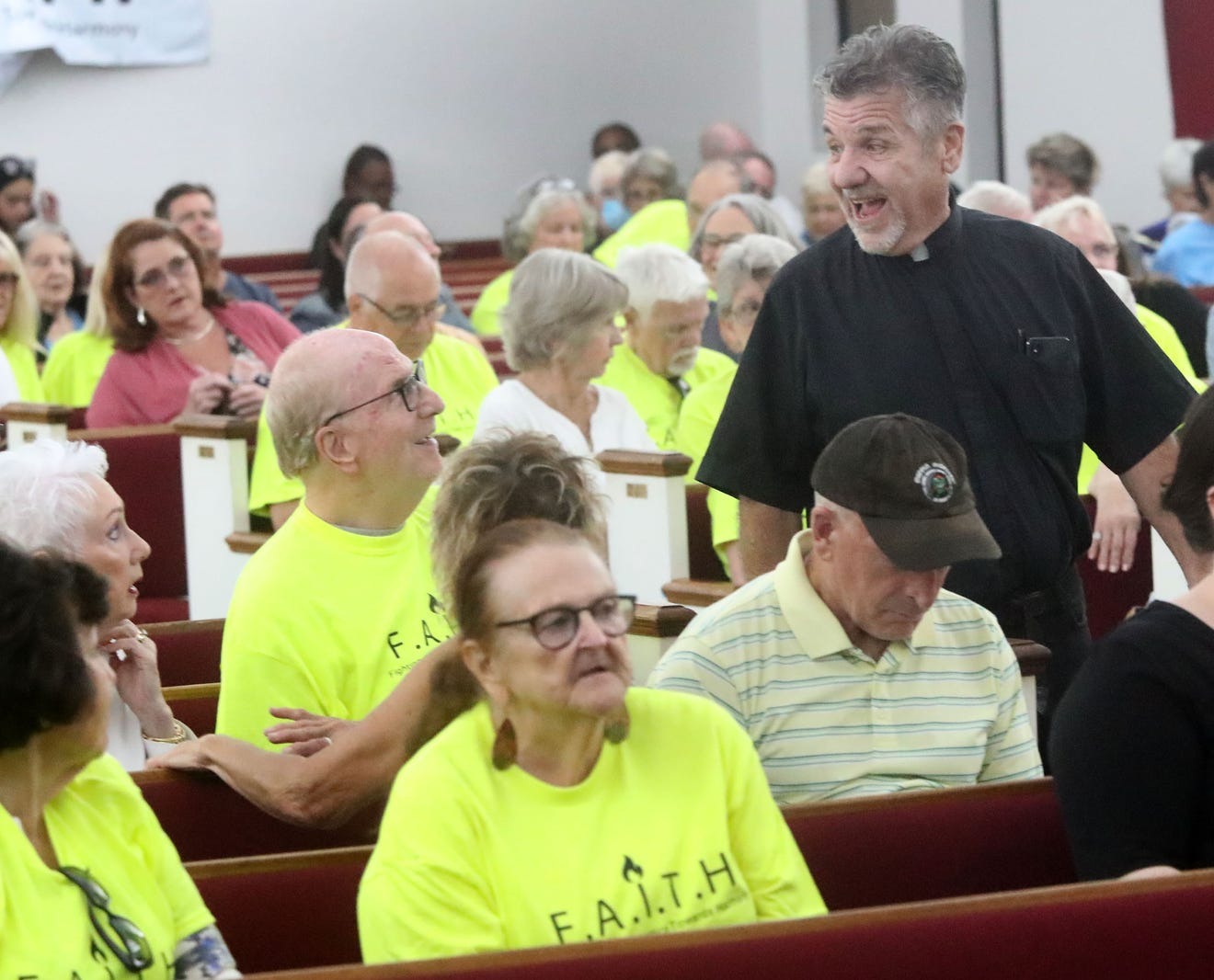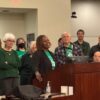By Eileen Zaffiro-Kean, Daytona Beach News-Journal
The FAITH group and some Daytona Beach city commissioners agree on at least two things: The city needs more affordable housing, and linkage fees should be considered as a funding source.
But a few city commissioners say FAITH should do something itself to increase the stock of affordable housing and stop pressuring Daytona commissioners to approach the problem in the precise way the group of 30 religious congregations has urged.
“I’d like to see them have skin in the game,” said City Commissioner Stacy Cantu. “Each church could put up $5,000.”
Playing off of FAITH’s mantra that faith can move mountains, City Commissioner Paula Reed said, “Help us move a mountain.”
“The city can’t do it alone,” Reed said. “Start a citizens’ trust fund. There’s more FAITH can do than point the finger at us. The churches together could buy a hotel and make it a shelter.”
FAITH leaders, however, say their churches already collectively give $2 million per year in charity to local people in need.
City commissioners are going to hold a meeting Wednesday evening at City Hall to discuss different ways they can start to fill the demand for affordable housing.
It’s a topic they’ve discussed many times over the past few years, but they’ve yet to come up with a plan to jumpstart the creation of the thousands of affordable housing units needed in the city. They’ve talked about possibly creating what’s known as a linkage fee, which involves charging developers in a way somewhat similar to impact fees.
“I am committed to a linkage fee,” said Mayor Derrick Henry. “I want a vote by the end of June or early July.”
While FAITH, city commissioners and community activists debate the best ways to help people cover their rent and mortgage, thousands of Daytona Beach residents struggle to keep up with all of their bills. Local leaders are probably going to try something new soon, but what that will be remains to be seen.
‘This is how we serve God’
The Rev. Phil Egitto, pastor of Our Lady of Lourdes Catholic Church in Daytona Beach and a FAITH board member, said FAITH is a justice organization that works to change policies and practices. He said FAITH’s churches and its individual members do charity work and support food pantries, Family Renew, First Step Shelter, Habitat for Humanity and Hope Place.
“We do our part to pay water bills, electric bills, rent assistance, emergency travel and much more,” Egitto said. “Just this week I paid $1,700 for someone’s rent. Certainly all people of faith are called to care for the hungry, homeless, the stranger, the imprisoned, sick. … Our congregations do more than their fair share. We polled our congregations and together our ministries of charity provide $2 million annually to local Volusia County residents.”
FAITH contends the local government and its elected officials must also do their part to help, he said.
“To have an affordable housing trust fund will help reduce the poverty in our community, give the workforce a place to live, and improve the quality of life in general in our city,” Egitto said. “This would seem to be the responsibility of our elected officials who have the responsibility to serve the needs of our community.”
Janice Topalanski, a FAITH Affordable Housing Committee member and Margaritaville resident, said the public has a right to ask elected officials about important issues such as affordable housing. Asking an elected official publicly allows a large number of people to hear their responses, and it holds the government representatives accountable, she said.
“Comments made to small groups of people are often forgotten or misinterpreted,” Topalanski said.
She noted that elected officials who come to FAITH’s annual action assembly are given up to two minutes to explain their yes or no response to a question.
She said FAITH is just trying to advocate “for real people.”
“We come at this from a place of humility. This is how we serve God,” Topalanski said.
How much rent is too much?
The federal government considers households paying more than 30% of their income on housing and utilities to be cost-burdened. But many Volusia County residents who earn less than $30,000 or $40,000 annually are faced with monthly rents and mortgages above $1,200, leaving too little for the rest of their financial demands.
At the March 20 City Commission meeting, City Commissioner Monica Paris said Volusia County teachers’ starting pay is $48,000. Paris contends that’s enough to cover a $1,500 monthly rent, which would chew up $18,000 of that teacher’s annual income and consume more than 30% of his or her yearly salary.
Paris said Daytona Beach firefighters start at $47,000, Daytona police start at $52,000 and Halifax Health nurses make at least $66,000. She argued that should be enough for them to afford local rents, but City Commissioner Dannette Henry pushed back hard, saying many people in those types of jobs have children to support. Henry, a teacher, has several children.
The mayor agreed, saying a person who makes $48,000 and pays $1,500 per month in rent is rent-burdened.
“Most residents of Daytona Beach make $38,000 to $40,000, and they’re experiencing immense burden,” he said. “They’re also paying more for insurance and health costs.”
Elderly Daytona residents are also “severely rent-burdened,” he said.
Daytona Beach resident Anne Ruby said a person making $47,000 annually shouldn’t pay more than $1,175 in rent, which would keep that person a little below 30% of their income going to housing costs. Someone making $66,000 should top out at $1,650, she said.
“I think we have to accept the people who make our service economy function can’t afford to live here, and we need to make that possible,” Ruby said. “You can do that without linkage fees, with smaller homes and smaller lots.”
What are linkage fees?
Linkage fees are basically impact fees assessed on new construction.
Daytona Beach city commissioners can explore charging linkage fees on new development that creates a demand for labor when workers can’t afford local housing. The fees can be collected from commercial development as well as market-rate residential development and placed in a trust that’s tapped to pay for construction and maintenance of affordable housing.
Back in the summer of 2022, a consultant the city hired recommended various linkage fees for different types of development ranging from $1.23 per square foot for new hotels to $23.35 per square foot for new office space.
If Daytona Beach charged $10 per square foot for 1,500 new residential units averaging 1,400 square feet each, that could raise $18.2 million in linkage fees over 10 years.
A non-residential linkage fee of $10 per square foot on developments that created 10.64 million square feet of new space could tally $53.2 million in linkage fees over 10 years.
Combined, that could come to $71 million in revenue for affordable housing in Daytona Beach.
City Commissioner Ken Strickland said FAITH’s recommended $5 per-square-foot linkage fee is much too high and would kill new development.
Ruby calculated that if the new Daytona Beach Costco was assessed a $5 per-square-foot linkage fee, it would pay $808,000. If the fee dropped to $1.77 per square foot, Costco’s linkage fee payment would be $286,000, she said.
“FAITH needed to hear no,” Ruby said.
Jackie Mole, FAITH’s co-chair and a member of Allen Chapel AME Church in Daytona Beach, said FAITH didn’t arbitrarily recommend $5 per square foot. The city government’s consultant study recommended $5-$7 per square foot on commercial development, and $10-$15 per square foot on residential development, he said.
“We found that to be unreasonable, but a $5 per square foot linkage fee would raise $3.5 million a year for Daytona’s affordable housing trust fund,” Mole said. “We are hoping that the city passes at least $2 per square foot at a minimum in order to produce the amount of housing our city needs.”
Spread the affordable housing cost burden
If Daytona Beach decides to assess linkage fees, state law will require the city to come up with ways to make a developer whole for its linkage fee payment. That could mean providing the developer density bonuses, flexible design standards, zoning variances, reduced parking requirements, accelerated approvals, reduced fees and tax incentives.
City Attorney Ben Gross said the city could also offer cash incentives, or waive permit and impact fees. But Gross cautioned that the city would have to be careful how it structured a linkage fee. If it was deemed to be a tax, it would have to be paid back, he said.
Gross noted other cities do impose linkage fees of $1 or $2 per square foot.
Addressing rising Daytona Beach rents: Daytona considering new fees to fund affordable housing
Cantu said FAITH members need to press other Volusia County cities to create more affordable housing as well.
“It’s not just a city problem for Daytona Beach,” Cantu said.
She also wants to see more church involvement.
“I think their heart is in the right place, but churches could match us in a trust fund,” Cantu said.
The mayor and Cantu said FAITH could take the money it spends on its annual action assembly, other major meetings, and certified letters mailed to elected officials and put that directly toward affordable housing.
“FAITH could meet by Zoom and put their gas money in a trust,” Henry said.
View the original story here.






